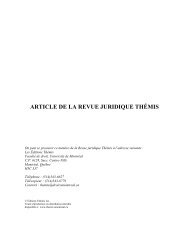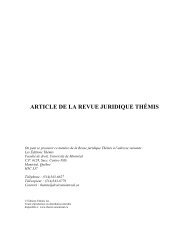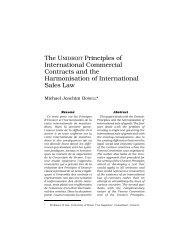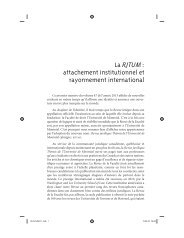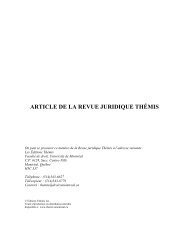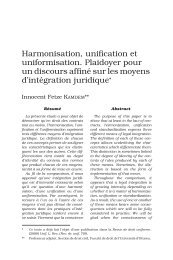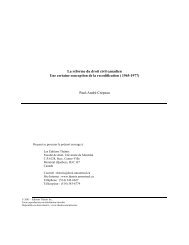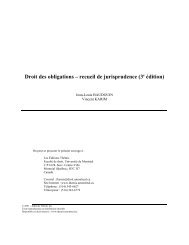The UNIDROIT Principles of International Commercial Contracts and ...
The UNIDROIT Principles of International Commercial Contracts and ...
The UNIDROIT Principles of International Commercial Contracts and ...
Create successful ePaper yourself
Turn your PDF publications into a flip-book with our unique Google optimized e-Paper software.
THE <strong>UNIDROIT</strong> PRINCIPLES AND MERCOSUR COUNTRIES 409<br />
helpful for the arbitrators given the growing internationalization <strong>of</strong><br />
contracts <strong>and</strong> litigation proceedings 59 .<br />
This is, for example, the result reached by the arbitral tribunal<br />
in a dispute between an American supplier <strong>of</strong> telecommunication<br />
systems (claimant) <strong>and</strong> a Middle Eastern manufacturer <strong>of</strong><br />
telecommunications cables (defendant). Under a pre-bid agre e m e n t<br />
the parties undertook to negotiate in good faith the supply <strong>of</strong> cables<br />
<strong>and</strong> the service agreements in the event the American company won<br />
a bid for the implementation <strong>of</strong> a telecommunications project in<br />
Saudi Arabia 60 .<br />
<strong>The</strong> American company’s bid was successful but nevertheless<br />
it terminated the preliminary agreement with the Middle Eastern<br />
cable manufacturer, arguing that the parties were unable to reach<br />
a permanent agreement by means <strong>of</strong> good faith negotiations. As<br />
there was no voluntary choice <strong>of</strong> the law applicable to the dispute,<br />
the claimant invoked the application <strong>of</strong> Saudi law (lex executionis),<br />
<strong>of</strong> English law (situs <strong>of</strong> arbitration) or <strong>of</strong> the State <strong>of</strong> Georgia (t h e<br />
location <strong>of</strong> the principal negotiations). <strong>The</strong> defendant, in turn ,<br />
invoked the application <strong>of</strong> the laws <strong>of</strong> the States <strong>of</strong> New York or New<br />
Jersey <strong>and</strong> asked the court to apply the <strong>Principles</strong>.<br />
With a view to preserve the parties’ undertaking to negotiate in<br />
good faith a permanent agreement, the tribunal chose the New Yo r k<br />
law, whose rules enforce this kind <strong>of</strong> undertaking, to govern the<br />
dispute. It also referred to the <strong>Principles</strong>, stating that international<br />
arbitrators can call upon the general principles <strong>of</strong> law where the<br />
case involves competing systems <strong>of</strong> law whose connecting factors<br />
do not sufficiently attract the contract. <strong>The</strong>re f o re the tribunal<br />
d e c l a red that the <strong>Principles</strong> w e re a useful legal source for establishing<br />
general international commercial contracts rules, underlining<br />
that the application <strong>of</strong> the <strong>Principles</strong> led to the same conclusion as<br />
that resulting from the application <strong>of</strong> New York law, that is, the<br />
enforceability <strong>of</strong> the undertaking to negotiate in good faith 61 .<br />
59 Id.<br />
60 Cited in White & Case <strong>International</strong> Dispute Resolution, v.10, March 1997, p. 3.<br />
04.09.1996 – ICC I n t e rnational Court <strong>of</strong> Arbitration, case 8540, in [www.unilex.<br />
info] – <strong>UNIDROIT</strong> <strong>Principles</strong> – cases (by date).<br />
61 Id.



